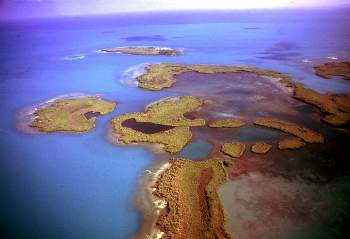Tiempo Climate Cyberlibrary
The Mauritius Declaration on Small Island Developing States
- Tiempo archive
- Complete issues
- Selected articles
- Cartoons
- Climate treaty
- Latest news
- Secretariat
- National reports
- IPCC
About the Cyberlibrary
The Tiempo Climate Cyberlibrary was developed by Mick Kelly and Sarah Granich on behalf of the Stockholm Environment Institute and the International Institute for Environment and Development, with sponsorship from the Swedish International Development Cooperation Agency.
While every effort is made to ensure that information on this site, and on other sites that are referenced here, is accurate, no liability for loss or damage resulting from use of this information can be accepted.
  |
Kanayathu Koshy and Sarah Granich discuss an international review of the Barbados Programme of Action for the Sustainable Development of Small Island States. Kanayathu Koshy is Director of the Pacific Centre for Environment and Sustainable Development at the University of the South Pacific in Suva, Fiji. Sarah Granich is a freelance consultant and Tiempo editor, based in Norwich, UK. |
The International Meeting to Review the Implementation of the Programme of Action for the Sustainable Development of Small Island Developing States (BPOA+10) took place in Port Louis, Mauritius, 10-14th January 2005.
About 2000 participants, including 18 presidents, vice-presidents, prime ministers, roughly 60 ministers and representatives of United Nations (UN) agencies, journalists from 114 countries and intergovernmental and non-governmental organizations participated in the meetings.
The International Meeting was preceded by two days of informal consultations on 8-9th January to facilitate preparations for the International Meeting, in particular, to advance negotiations on the Strategy for the Further Implementation of the Programme of Action for the Sustainable Development of Small Island Developing States (SIDS). The Main Committee for negotiations met from 10-13th January.
Between 10-12th January, the International Meeting held five plenary panels on the themes of: environmental vulnerabilities of SIDS, special challenges of SIDS in trade and economic development, the role of culture in the sustainable development of SIDS, addressing emerging trends and social challenges for the sustainable development of SIDS, and building resilience in SIDS.
During the final two days, the high-level segment of the International Meeting met to debate the "Comprehensive Review of the Implementation of the Programme of Action for the Sustainable Development of SIDS", and to hold round tables on "The Way Forward", with emphasis on resource mobilization and capacity building. There were many side events and partnership activities focusing on the role of youth, civil societies, community groups, UN bodies and donor agencies.
By the time the International Meeting was gaveled to a close, the delegates had adopted the Mauritius Declaration and the Mauritius Strategy for the Further Implementation of the Programme of Action on the Sustainable Development of SIDS as the major outcomes.
Though the Mauritius Declaration did compromise on a number of issues, all delegates agreed that they were, overall, highly satisfied with the result. In particular, there was agreement that SIDS should be treated as a "special case" in regards to sustainable development and a commitment to full implementation of the United Nations Framework Convention on Climate Change and further promotion of international cooperation on global warming.
|
|
The Belize archipelago © J Soussan |
The document that formed the basis for negotiations at Mauritius was a synthesis product of the Alliance of Small Island States Strategy Paper from the Inter-regional SIDS Preparatory Meeting in Nassau, the Bahamas, 26-30th January 2004. This text was further considered by the International Preparatory Meeting, 14-16th April 2004, at the UN headquarters in New York, during the Twelfth Session of the Commission on Sustainable Development and by informal meetings at the United Nations in October 2004. The Strategy Paper contained chapters on the priority areas of the BPOA and identified new and emerging issues, including the graduation of SIDS from least developed country (LDC) status, trade, health, capacity building and culture.
The discussions at the International Meeting led to agreement on chapters dealing with: natural and environmental disasters, energy resources, tourism resources, transport and communication, science and technology, sustainable capacity development and education for sustainable development, sustainable production and consumption, health, knowledge management and information for decision-making, culture, coastal and marine resources, land resources, and graduation from LDC status.
Climate change, trade and waste remained thorny issues for the negotiating groups. During the negotiations, Tuvalu expressed extreme dissatisfaction with the United States over its position in refusing to formally participate in the global strategy to reduce greenhouse gas emissions. The International Meeting did, however, recognize that climate change presents a serious threat to SIDS. Gordon Bispham, Director of the Caribbean Policy Development Centre said that "all parties have agreed that climate change is having an effect on small islands right now and that we need to put policies in place to reverse this."
Small Island Developing States have argued for many years that there should be international agreement on the return of trade preferences for them due to their isolation and limited resources. These nations have also argued that for years they have been hampered and constrained by their limited capacities and have had little assistance from the global community in being integrated fully into the global economy. In recognition of these concerns, the Mauritius Declaration notes that "many Small Island Developing States either are not represented in Geneva, or are still grappling with the process of accession to World Trade Organization membership. Most Small Island Developing States also experience serious capacity constraints in meeting World Trade Organization obligations."
Although trade was not as fully acknowledged in the Declaration as many delegates would have liked, the Mauritius Declaration does also note that "attention should be focused on the specific trade and development-related needs and concerns of Small Island Developing States to enable them to integrate fully into the multilateral trading system." "Without some kind of recompense for the erosion of the trade preferences, we may as well close shop. It is impossible for small economies such as ours to compete internationally," said the Mauritius Chamber of Commerce representative, Hamid Jhumka. United Nations Secretary-General Kofi Annan noted that SIDS would prefer to "trade themselves out of poverty instead of living on handouts."
On these more contentious issues, the decisions may be summarized as follows.
Climate change. The Strategy recognizes that the SIDS are already experiencing "major adverse effects of climate change" and that "adaptation to adverse impacts of climate change and sea-level rise remains a major priority." It also promotes "increased energy efficiency and development and use of renewable energy as a matter of priority, as well as advanced and cleaner fossil fuel technologies."
During the panel discussion on environmental vulnerabilities, it was stated that in some cases the choice is limited to remaining on the island/atoll or seeking shelter elsewhere. While "natural hazards are inevitable, disasters are not" and efforts must be intensified to increase the resilience of SIDS. The environmental vulnerability index launched at the International Meeting by the South Pacific Applied Geoscience Commission could be used to assess the vulnerability of countries to climate-related impacts.
Trade. SIDS negotiated to secure agreement for special and preferential treatment and for recognition as a new category of countries in the World Trade Organization. The final Mauritius Strategy contains references to the special case of SIDS by prioritizing efforts to integrate them fully into the multilateral trading system.
Waste. The inclusion of liability issues regarding the transboundary movement of hazardous waste, World War II shipwrecks, and transportation of radioactive material was another highly contentious point in the negotiations. On the transboundary movement of hazardous waste, there was agreement for the cessation of such transport in SIDS region as the "ultimate desired goal".
|
UN
Works |
During the International Meeting, SIDS continued to struggle to attract the international support they consider necessary for their sustainable development.
Since the Barbados Conference in 1994, the focus of the international agenda has changed with increasing attention on security concerns, the implementation of the Millennium Development Goals, and the prioritization of domestic good governance over governance reforms at the international level. SIDS wanted to attract attention to their evolving agenda, including the need to address new and emerging issues such as the impacts of trade liberalization and globalization, information and communication technologies, and health and HIV/AIDS, in addition to the concerns contained in the Barbados Plan.
The Mauritius Strategy emphasizes that SIDS “are very vulnerable to natural and environmental disasters with devastating consequences to their economy, environment and social life." The Strategy proposed to use the opportunity of the forthcoming World Conference on Disaster Reduction in Kobe, Japan, to consider the specific concerns of SIDS, including in the areas of insurance and reinsurance arrangements.
Following closely on the tragic impacts of the 26 December Indian Ocean tsunami, the delegates were fully convinced that the worst fears of SIDS could easily become realities. As Kofi Annan observed, the small islands position carried more weight now because of the "shift in sympathy" by the international community in response to the magnitude of the tsunami tragedy. "Even those who had been a bit sceptical about the impact of global warming cannot say that they have no idea of the damage water can do," he said.
An encouraging feature of the Mauritius Strategy is the effort to prioritize support for resilience building and vulnerability projects, adding social and economic development considerations to the BPOA and making it considerably more attractive to donors. Supporting this recognition, the United Nations Development Programme - the lead UN agency for the implementation of the Millennium Development Goals - launched a SIDS Resilience Building Facility to assist SIDS to develop the capacity to formulate and implement initiatives to reduce their vulnerabilities.
|
From the Pacific At their special retreat in Auckland, New Zealand, on 6th April 2004, the Pacific Island leaders adopted their new vision for the Pacific, which seeks to give all Pacific peoples lives that are "free and worthwhile". In addition to economic growth, socio-cultural and environmental protection, good governance and security were also recognized as key priorities for bringing about sustainable development. Within the Pacific context, the major concerns in the area of economic development include negative or low growth and resource depletion. In social development, there are serious concerns over rising poverty, declining health and education standards and facilities and other equity issues. There are also major environmental issues relating to pollution, waste management, loss of biodiversity, and natural disasters. And in governance and security, the major challenges are around institutional deficiencies, poor resource management, political instability, breakdown of law and order, inequalities, trans-national crime and other human security concerns. A Pacific Plan has been developed to "give effect to" their new vision through the promotion of "deeper and broader regional cooperation". The Pacific is fortunate in that it already has a strong institutional framework in the form of regional organizations, institutions and existing sub-regional bodies, which can be used as a foundation for broadening and deepening regional cooperation. It was the view of the leaders that partnership at different levels must be encouraged to meet common responsibilities and provide services cost-effectively, such as: common regional reporting on international obligations; regional representation at international level; agreed regional policy frameworks where needed; common laws and policies; legal/legislative; technical services; transport services; research and data; and training and education. The Pacific region is noted for its special governance systems based on traditional ways and indigenous knowledge and practices that promote sustainable development in a Pacific way. Judging from the attention given to culture during the International Meeting, it is expected that the Mauritius Strategy will help ensure the survival of Pacific communities, combining the best of both worlds. The challenge now is to mainstream sustainable development at a time of decreasing official development assistance to SIDS, declining foreign direct investment flows, diversion of development resources to meet new security obligations, graduation of SIDS from concessionary resources, and establishment of new trade rules - all serving to further exacerbate SIDS' growing vulnerabilities. But as we heard during the World Summit on Sustainable Development and again at Mauritius during the International Meeting, it is all about making it happen by considering measures equal to the task. |
There is little doubt that the International Meeting strengthened partnerships, increased SIDS' ownership of responsibility over their sustainable development, renewed and/or reprioritized international community support, improved SIDS-SIDS and South-South cooperation, increased UN specialized agency engagement in SIDS issues and identified new means of implementation, including the launching of the SIDS University Consortium discussed below.
On the other hand, some might criticize the International Meeting's outcomes, noting that the text does not provide clear direction to other international organizations and processes, such as the international financial institutions and multilateral environmental agreements, and that there were almost no commitments for new and additional financing or projects at the meeting apart from addressing vulnerability to disasters, such as tsunamis.
In the words of Kofi Annan, SIDS will have to deepen partnerships at all levels - through South-South cooperation, through closer cooperation with developed countries, by engaging more actively with civil society, and by tapping the knowledge and capacities of regional organizations such as the Council of Regional Organisations in the Pacific (CROP) agencies and the Indian Ocean Commission - in order to effectively implement the Mauritius Strategy.
There was a clear demonstration of this approach to SIDS capacity building for the implementation of sustainable development when the SIDS University Consortium was launched in the final Plenary. A Memorandum of Agreement was signed by representatives of five founding member institutions: the University of Malta, the University of Mauritius, the University of the South Pacific, the University of the Virgin Islands, and the University of the West Indies. The main aim of the consortium is to strengthen the national capacity of small island states to implement the Barbados Programme of Action. The Consortium is expected to improve tertiary level networking through the promotion of e-learning, participation in the UN Decade of Education of Sustainable Development initiative and by conducting targeted SIDS specific research and training.
At the concluding session, the Secretary-General of the International Meeting, Ambassador Anwarul Chowdhury, repeated his call for a dynamic system of monitoring the implementation of the Mauritius Strategy. "Monitoring should not conclude with simple stocktaking, but should be a process by which implementation loopholes, failures or slackness can be identified and corrective measures taken," he said. "With the outcome document now in our hands, we have to look forward towards the road to implementation. How we will accomplish this process is in the hands of the stakeholders - the donor community, the multilateral financial institutions, civil society, private sector, regional organizations and the Small Island Developing States themselves."
Small Island Developing States can take satisfaction that, ten years after the Programme of Action was agreed upon, the international community now recognizes the special circumstances of both their fragile environments and their fragile economies.
Further information
Kanayathu Koshy, Pacific Centre for Environment and
Sustainable Development, University of the South Pacific,
PO Box 1168, Suva, Fiji. Fax: +679-3-309176. Email:
koshy_k@usp.ac.fj.
Web: www.sidsnet.org/pacific/usp/pace/.
Sarah Granich, Tiempo Editorial Office, School of
Environmental Sciences, University of East Anglia, Norwich
NR4 7TJ, UK. Fax: +44-1603-507784. Web: www.tiempocyberclimate.org/newswatch/.
E-mail: slv.granich@virgin.net.
On the Web
To mark the Mauritius meeting, Tiempo Climate Newswatch has
made available a series of related articles and
documentaries.
- Ambassador Anwarul K. Chowdhury discusses the current status of Small Island Developing States and his hopes for the meeting
- Kanayathu Koshy discusses Pacific preparations for the review of the Barbados Programme of Action
- Tom Roper describes the innovative Global Sustainable Energy Islands Initiative, intended to assist Small Island States develop renewable energy and energy efficiency projects
- The documentary Regional CHARM Guidelines for Pacific Island Countries, presented as streaming video, describes the Comprehensive Hazard And Risk Management process for the Pacific islands
- The documentary Islands and Climate Change, presented as streaming video, describes the threat posed to the Pacific island nations by climate change and unsustainable development
- Ashmita Gosai, Penehuro Lefale and Jim Salinger describe the content and application of the Island Climate Update, a highly successful seasonal climate bulletin
- Finally, Ambassador Anwarul K. Chowdhury presents a personal perspective on the role of his office
The Tiempo Climate Cyberlibrary lists sites covering Small Island Developing States issues.
A full report on the proceedings of the International Meeting is available from Earth Negotiations Bulletin. The conference website contains documents, webcasts, press releases, background material and other resources.
Bright Ideas

General Electric plans to cut solar installation costs by half

Project 90 by 2030 supports South African school children and managers reduce their carbon footprint through its Club programme

Bath & North East Somerset Council in the United Kingdom has installed smart LED carriageway lighting that automatically adjusts to light and traffic levels

The United States National Oceanic and Atmospheric Administration and the American Public Gardens Association are mounting an educational exhibit at Longwood Gardens showing the link between temperature and planting zones

The energy-efficient Crowne Plaza Copenhagen Towers hotel is powered by renewable and sustainable sources, including integrated solar photovoltaics and guest-powered bicycles
El Hierro, one of the Canary Islands, plans to generate 80 per cent of its energy from renewable sources

The green roof on the Remarkables Primary School in New Zealand reduces stormwater runoff, provides insulation and doubles as an outdoor classroom

The Weather Info for All project aims to roll out up to five thousand automatic weather observation stations throughout Africa

SolSource turns its own waste heat into electricity or stores it in thermal fabrics, harnessing the sun's energy for cooking and electricity for low-income families

The Wave House uses vegetation for its architectural and environmental qualities, and especially in terms of thermal insulation

The Mbale compost-processing plant in Uganda produces cheaper fertilizer and reduces greenhouse gas emissions

At Casa Grande, Frito-Lay has reduced energy consumption by nearly a fifth since 2006 by, amongst other things, installing a heat recovery system to preheat cooking oil
Updated: May 15th 2015

